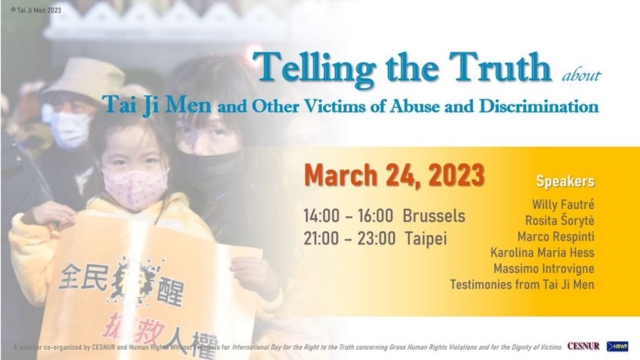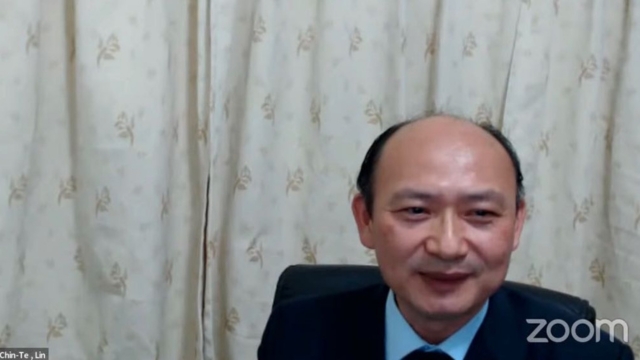A webinar featured scholars and human rights activists from different countries calling for truth, justice, and a solution of the case.
by Daniela Bovolenta

On March 24, 2023, the United Nations International Day for the Right to the Truth Concerning Gross Human Rights Violations and for the Dignity of Victims, CESNUR and Human Rights Without Frontiers organized one of their bi-monthly webinars about the Tai Ji Men case, under the title “Telling the Truth About Tai Ji Men and Other Victims of Abuse and Discrimination.”
Willy Fautré, co-founder and director of Human Rights Without Frontiers, introduced the webinar with four preliminary remarks. First, it denounced the epidemic of fake news, of which Russian propaganda supporting its aggression against Ukraine offers today the most egregious example. Second, he emphasized how truth is the basis to assert and defend human rights. Third, Fautré noted that when truth is not told, perpetrators of human rights violations escape with impunity. Fourth, he applied these principles to the Tai Ji Men case, noting that since truth has not been told, those responsible of gross human rights violations against them have never been punished.
Fautré then introduced a video message from Dr. Hong Tao-Tze, the Shifu (Grand Master) of Tai Ji Men, who emphasized the spiritual roots of human rights. He indicated freedom of religion or belief as a frequently violated human right in the 21st century, and noted how taxes are one of the tools maliciously used for such violations. He also presented his proposal for an International Day Against Judicial and Tax Persecution by State Power.

Fautré presented the first two speakers, Rosita Šorytė, a human rights expert and member of the scientific committee of the International Federation for Freedom of Belief (FOB), and Marco Respinti, an Italian scholar and journalist who serves as director-in-charge of Bitter Winter.
Šorytė reminded the audience that 24 March is a day of observance commemorating the assassination of El Salvador’s Archbishop Óscar Romero, murdered on 24 March 1980 for his public denunciations of human rights abuses in his country.
In the case of Romero, after twenty years at least the truth about his murder became known, although the instigators and perpetrators were never punished, since some had died and others had gone into hiding and were never found. In other cases, Šorytė said, the full truth about human rights violations has never been fully revealed, which often happens when some groups are stigmatized as “cults.” This also occurred in Taiwan in the Tai Ji Men case, she concluded, where the truth is the necessary pre-condition for a political solution respecting fairness and justice.
The full video of the webinar.
Respinti explained that freedom of religion or belief as a human right is fundamentally a right to truth. It is a right to pursue truth and live accordingly to one’s concept of truth. The answers to the question of truth may be very different, Respinti said, but freedom of religion or belief demands that these answers may be freely sought, proclaimed, and shared with others. This fundamental right, Respinti concluded, was denied to Tai Ji Men in Taiwan for more than a quarter of a century.
Karolina Maria Hess, a researcher at Jagiellonian University in Krakow, mentioned the problems of human rights in a post-Communist society, Poland, where unearthing the truth about the Communist years is not easy, and compared them to the situation of transitional justice in Taiwan and the Tai Ji Men case. She introduced a video about Dr. Hong’s property in the Swiss Mountain Villa community in Xizhi, Taiwan, intended for a Tai Ji Men Academy, which was frozen in 1997 and kept as a collateral in the Tai Ji Men tax case in 2003. The property was given back to Dr. Hong in 2020 but by then it was in a dilapidated and half-destroyed condition.

Hess then presented five testimonies from Tai Ji Men dizi (disciples). Luna Ho, an elementary school teacher, celebrated the saints and heroes this day of observance remembers. She went through the long calvary of Tai Ji Men and how difficult it was to both tell and be told the truth by the Taiwanese bureaucrats who continued falsely accusing the movement of tax evasion. As an elementary school teacher, Ho said, she struggles to teach children how to distinguish right from wrong. This is even more difficult, she concluded, if society does not affirm truth and protects justice.
Lin Chin-Te, a manager in an electrical engineering company, told several stories of police officers who visited Tai Ji Men academies with fear, believing dangerous activities and even black magic might be practiced there, only to realize that the tales they had heard were false and the dizi were peaceful and amiable people. Lin explained that, based on international rules, electrical companies do indemnify customers when they make gross mistakes. Taiwan’s government should do the same for Tai Ji Men, he said.

Tina Lee, a designer, reported how she overcame her natural shyness thanks to her practice of Qigong with Tai Ji Men and ended up expressing her publicly on behalf of tax reform in Taiwan. She also attended earlier this years the International Religious Freedom Summit in Washington DC. She was grateful for the opportunity of representing Tai Ji Men and making its case known, she said, but was also very moved when she visited the booth of human rights activists confronting the regime’s repression in Myanmar. She then realized that the struggle for freedom and human rights is universal, and requires a global cooperation.
Dinah Lai, a research assistant, paid homage to the figure of Archbishop Romero, and said that those martyred for human rights and justice do not really die because their memory and teachings are immortal. Although nobody was killed, Lai said, the amount of human rights violations and abuse in the Tai Ji Men case was impressive. Equally impressive was that the persecution did not prevent Dr. Hong and Tai Ji Men to continue their valuable international efforts on behalf of world peace and love. A way of acknowledging their good work, Lai said, would be to render justice to them and solve the Tai Ji Men case once and for all.

Steven Du, an application engineer, focused on the immoral bonus system that gives financial rewards to tax bureaucrats in Taiwan who collect money from tax bills, be they justified or not. He traced the roots of this system to the rewards paid to spies who denounced opponents of the regime during the Martial Law period. Du insisted that the system of bonuses as it now exists in Taiwan create systemic corruption, and mentioned several examples unrelated with the Tai Ji Men case—which of course is another instance where the bonus system fueled injustice.
Massimo Introvigne, an Italian sociologist and the editor-in-chief of Bitter Winter, offered the conclusions of the webinar by commenting on a famous sermon by Archbishop Romero on prophecy. While in our common language we call prophets those who predict the future, the oldest meaning of the word indicates one who proclaims the truth even when this is unpopular and may lead the prophet to be persecuted or killed. This happened to Romero, Introvigne said; Dr. Hong and Tai Ji Men also proclaim a prophetic message and not surprisingly they are persecuted.

The event concluded with a video about the recent trip of Tai Ji Men dizi to Turkey, where they brought peace, love and solidarity after the deadly February earthquake.
Source: Bitter Winter

